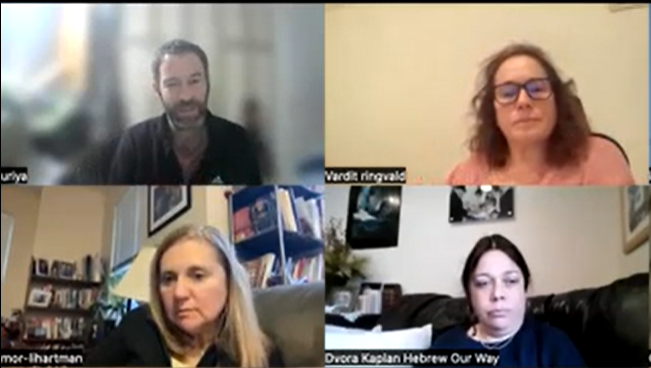Speaking with Hebrew Teachers post October 7th
By Vardit Ringvald, December 2023

I was sitting in front of a group of Hebrew educators and my heart ached. They looked confused and worried and you could see there was a heavy burden on their mind. They kept telling me how they are viewed in their schools as the personas that represent Israel and Israelis and therefore have the answers to the main questions, “How did October 7th happen?” “Why did it happen?” “What is Otef Aza?” “What is Hamas?” “Who are these people?” – as well as, “What does it all mean for us – the American Jews?”
“I did not know what to tell them,” one of the teachers said, “I am not an expert in Israeli politics or Israeli history or the history of wars, and terror and Middle East geopolitical issues.” “The little I knew from the news – and I wonder if I should tell them the truth – is that the Army was not there to protect the people of the South. I was afraid to admit that Israel was not the strong nation we let them believe it is,” and, she added, “The country that is famous for its brilliant innovation was not able to prevent it. Am I going to undermine the role of Israel in protecting the Jews in Israel and in the Diaspora?”
Another teacher added, “I did not want to hurt their feelings … how much should I tell them about it? I understand why I became an address for all of these questions but – I am only a Hebrew teacher – should I know the what and the how to approach it? I am not prepared for it.”
Others also mentioned the fact that some faculty members were either avoiding them or even argued with them about the right for Israel to exist; people with whom they work on a daily basis suddenly saw them as the enemy – as the oppressors, as baby killers. Suddenly their professional role became suspicious to the others – teaching Hebrew became in their eyes a venue to teach their students about “an oppressor nation.” Their students felt it as well outside the classroom and came with a request for advice – “What should I tell my peers?” “How can I justify learning about Israel in your Hebrew class?” “I must admit that I did not have the tools to support them. I had my own feelings and my own knowledge I gathered from the Israeli news, but not enough knowledge to give them my answers that I can be sure are the right ones.”
I listened to them with sadness. These are professional Hebrew educators who know the profession – however, they are lacking the in-depth understanding of the context in which the language is used and was revitalized. Language reflects the people, their place, and their historical background, their beliefs, rituals, and so on. As a language teacher, you need to be knowledgeable and equipped with the skills to constantly be aware of how each element of the language you teach is connected to the larger contexts it represents.
In lacking this knowledge, Hebrew educators constantly miss the many opportunities to show students how the language reflects the core knowledge related to the daily life of its speakers or the connection to the geopolitical context in which the language lives.
Hebrew language educators need to possess knowledge about the linguistic elements of Hebrew, however, without the skill of inquiry to better understand how this language which was revitalized by Zionist ideology reflects the Zionist ideas and its history, they create a void for their learners.
This moment of tragedy reveals the need to reset the way we train Hebrew educators. How we need to embed them in the right environments where knowledge is constantly created and that support the development of critical thinking and inquiries. This is the reason that academic institutions where scholars are constantly creating the knowledge is the right place to educate them. This is why a place like Brandeis is the appropriate place to educate the new cadre of Hebrew educators.